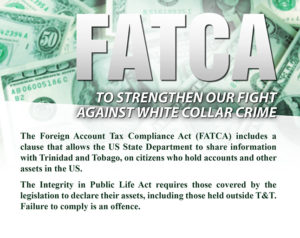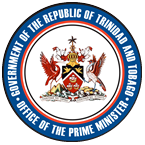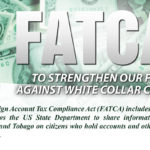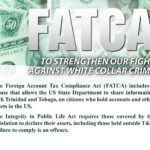- 30 JAN 2017
FATCA to strengthen our fight against white collar crime
 The Foreign Account Tax Compliance Act (FATCA) includes a clause that allows the US State Department to share information with Trinidad and Tobago on citizens who hold accounts and other assets in the US.
The Foreign Account Tax Compliance Act (FATCA) includes a clause that allows the US State Department to share information with Trinidad and Tobago on citizens who hold accounts and other assets in the US.
It has long been established that white collar crime is often connected to corruption, the illegal drug trade and its attendant violence.
Trinidad and Tobago signed the agreement to Improve International Tax Compliance and to Implement FATCA in August 2016. The agreement states –
“Whereas, the Government of the United States of America collects information regarding certain accounts maintained by U.S. financial institutions held by residents of Trinidad and Tobago and is committed to exchanging such information with the Government of the Republic of Trinidad and Tobago and pursuing equivalent levels of exchange, provided that the appropriate safeguards and infrastructure for an effective exchange relationship are in place;”
The Honourable Stuart Young, Minister in the Office of the Prime Minister and Minister in the Office of the Attorney General and Legal Affairs further explained this clause during the debate of the bill to enact FATCA in September 2016.
Young said, “And as has been suggested, there is a reciprocity part of the arrangement, where the Americans have agreed to provide information to Trinidad and Tobago, but it is not carte blanche any information.”
“It is a certain and specific type of information that is to be provided to the Board of Inland Revenue, which is the authority that is given the power per this Bill, to both be the pipeline of information to the United States Treasury Department and IRS, but also the receiver of information, if our Board of Inland Revenue wants to receive information of any Trinidad and Tobago national away.”
He added, “For example, one of the occasions where the Board of Inland Revenue—and it is the Board of Inland Revenue of Trinidad and Tobago and not the Government, not the Minister—who may believe that there is any citizen of Trinidad and Tobago that has assets outside of the jurisdiction and is hiding assets, hiding bank accounts in other jurisdictions, that they have not paid the tax that they should have in Trinidad and Tobago, our Board of Inland Revenue may now reach out to the US Treasury Department or the US IRS and request of them that information be provided, and that is something that seems to be resisted now by those on the other side.”
It should also be noted that the Integrity in Public Life Act requires those covered by the legislation to declare all of their assets. This includes those being held outside the jurisdiction of Trinidad and Tobago. Failure to comply is an offence under the Act.
Once enacted, FATCA will become another tool that can be used to ensure that those who have sworn to serve Trinidad and Tobago are upholding the tenets of the Integrity in Public Life Act.






